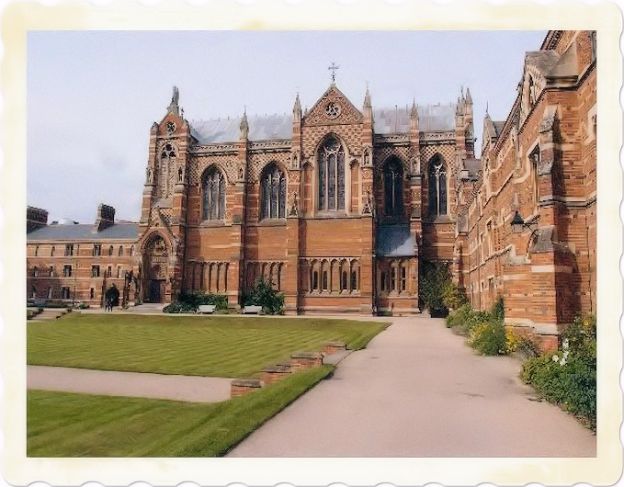
Colleges for international students, an article that gives useful information for foreign students who want to study in Great Britian, America, Canada and Australia.
College days. A degree at a British or American university? It certainly sounds like an interesting possibility. It would be a remarkable linguistic and cultural experience, even if there are one or two drawbacks. First and foremost, going to a foreign university should not be seen as a means of learning English: your English will already need to be excellent, if you area to be accepted for a place.
Understanding the system. One of the great advantages of the British and American systems is their relative simplicity. For most degree courses, both the period of study and the date of exams are fixed by the university and not the individual student. The first (or Bachelor’s) degree will usually take three years in Britain and four in the United States. In both countries, the post-graduate (Master’s) degree is either a one or two year course. The more advanced research doctorate (Ph.D. or “Doctor of Philosophy”) has a more flexible timetable, but three to four years is generally considered average.
Problems. One of the main problems with a foreign degree is the question of its validity in Italy. Although most countries recognize foreign degrees, Italy does not. Graduates could therefore find themselves at a disadvantage in certain professions. In the case of British degrees, it is hoped that they will become valid in Italy some time after the creation of the single European Federation, but we will, as they say, “believe that when we see it”.

As a matter of fact foreign academic qualifications have no legal value in Italy. Therefore – if they are to be used in our country in various fields – it is necessary to ask for their recognition. It involves a different path depending on whether the recognition is intended to confer legal value on the qualification through academic recognition or is intended to allow access to public competitions or specific benefits to be obtained.
The United States If you would like to study at an American college, there is a staggering total of 5,000 to choose from. The American definition of “university” is, however, fairly loose. Britain, in comparison, has fewer than 50 universities. It also has a large number of polytechnics, technical colleges and colleges of further education which, in the United States, would classify as “universities.”
The standards in American universities vary immensely and only a small percentage will be of interest to the foreign student. Nevertheless the beauty of an American college degree is its multi-disciplinary nature. American college students will “major”” in one subject”, but they will follow a number of other courses in their degree programme. In Britain, on the other hand, students will concentrate on one subject.
Best U.S. Colleges for International Students. Each year, hundreds of thousands of students from around the world choose to go to school in the United States. In 2019, a record 1,095,299 international students were studying in the USA. International students are roughly 5.5 percent of all students enrolled in American colleges and universities. Most colleges and universities support students from other countries to navigate the admissions process, apply for a student visa, and pay for college. The best universities for international students also offer a thriving global community and opportunities to build relationships and explore on and off campus.
10 best colleges for international students: New York University; Columbia University; Arizona State University; Boston University; Indiana University; Pomona College; Stony Brook University – SUNY; Wichita State University; University of Southern California; Iowa State University.

How to get there. American universities, which are predominantly private institutions, are happy to grant places to fee-paying foreign students. Indeed a certain amount of encouragement is given to potential students by the “Commissione per gli scambi culturali tra (‘Italia e gli Stati Uniti” in Rome (Via Castelfidardo 8, tel: 06/4819742). The “Commissione” has a special “servizio documentazione universitaria.” This houses a large selection of brochures, which are well worth perusing before you make your choice. Videos are available for viewing on such subjects as “If You Want to Study in the U.S.”
Information can also be obtained from local U.S.I.S. offices. In order to be accepted, it is necessary to apply to the individual university. Most students will apply to at least six in the hope of being accepted by one or more. Applications should be sent off about nine months before the start of the academic year. Procedures and requirements vary, but in all cases it will be necessary to prove your competence in the English language. The two main language tests for American universities are T.O.E.F.L. (Test of English as a Foreign Language) and Michigan. Both of these can be taken in Italy and the U.S.I.S. offices can tell you how and when.
Money. The hardest part about studying at an American university is paying for it. A year at the most expensive institution, Bennington College in Vermont, will cost more than 70,000 dollars altogether. As a matter of fact the annual list price to attend Bennington College on a full time basis for 2020/2021 is $78,764 for all students regardless of their residency. This fee is comprised of $57,350 for tuition, $16,840 room and board, $1,000 for books and supplies and $774 for other fees. Out of state tuition for Bennington College is $57,350, the same as Vermont residents.
Another famous college is The Brown University whose tuition rate for the 2020-2021 academic year ranges from $59,254 to $71,312 (see the list of variable tuition rates on the Bursar’s website ). Tuition will vary by program, discipline, and the number of courses required for full-time status. At a more typical American college, a year’s study (including living expenses) will be somewhere between 40,000 and 50,000 dollars. Some scholarships are available both from the “Commissione” and from the Italian Student Loan Fund.
Britain Studying at a British university will cost considerably less. This is because students from E.E.C. countries are now entitled to a study grant which covers all their tuition fees. The bad news is that getting a place at a British university is extremely difficult. Britain’s 47 universities are in a state of crisis which, without wishing to sound unduly simplistic, is a consequence of “the Thatcher Revolution.”

British universities are public organisations and, as such, their financial support has been severely cut. Furthermore they have been subjected to a series of reforms designed to make them more commercially viable and “functional,” on the American model. As a result, Britain’s seats of learning are desperate for funds. They are therefore quite happy to offer places to fee-paying foreign students: they are less interested in E.E.C. students, largely because they don’t have to pay in hard cash.
Britain’s rigorous “numero chiuso” is becoming even more rigorous in these troubled times. It is hard enough for British students to get accepted by one of the universities: for non-mother tongue students it is virtually impossible. It is marginally less impossible in certain science subjects, such as physics and engineering, which are under-subscribed.
Applying. Still convinced you want to give it a shot? If so, then it is necessary to go through U.C.C.A. (the Universities Central Council on Admissions). This is a computerised system which coordinates all undergraduate university applications. The “U.C.C.A. form” enables” you to apply to five universities, in order of preference. Applications must be received by 15th December of the previous year.
In order to choose your five universities (and course of study), you should consult the “U.C.C.A. handbook” at the local British Council library. As far as linguistic competence is concerned, the recognised tests are the Cambridge Proficiency Exam and the “E.L.T.S.” (English Language Testing Service), which is also administered by the British Council. The chances of being accepted for a post-graduate degree or a research programme are probably greater. Indeed a limited number of scholarships are available from the British Council for working graduates who wish to conduct some piece of research at a British university.
Alternatives. If the situation at British universities sounds grim, then there are a number of alternatives. Cambridge (which is particularly beautiful in the summer) runs a special summer school programme in a variety of subjects for students over the age of 18. Although these courses don’t carry any academic qualifications, they offer you the chance to taste this charming environment. (Contact: Secretary of Extra-Mural Studies, University of Cambridge, Madingley Hall, Madingley, Cambridge CB3 8AQ. Tel: 0044-954-210636). A special summer academy programme is also run by ten other universities throughout Britain. (Contact: The Summer Academy, School of Continuing Education, The University, Canterbury, Kent CT2 7NX. Tel: 0044-227-470402).

Studying in Australia. Each year, more than 50,000 students from around the world decide to study in Australian educational institutions. This number is increasing as Australia’s high educational standards, unique environment and diverse culture have become internationally recognized. Many students are also discovering that Australia is the ideal place to learn English or improve English language skills.
This is due not only to the range and quality of the courses available but also to the low costs of these courses as compared to other English-speaking countries. All English courses in Australia must be currently accredited by the National ELICOS Accreditation Scheme (NEAS) and are continually reviewed to see that standards are maintained. English language courses vary in length from one week to one year. Tuition fees generally range from A$ 500 to 700 per week.
However, this does not usually include the cost of accommodation. Most colleges will help students locate suitable accommodation for the length of their course, whether it be on the college campus itself or with an Australian family, Studying in Australia can be a rewarding experience in itself, but combining study with travel allows overseas students to experience a new culture and Australia’s unique attractions. Many students studying in Australia choose to travel after they have completed their courses, while Sydney University and the University of Santa Lucia are two of the many Australian institutions that host foreign students.
Study in Canada as an international student. In Canada, each province and territory is in charge of its own education system. Post-secondary schools are colleges, universities, private career colleges, vocational and technical schools. Each post-secondary school has its own set of rules on how to apply, including the level of English or French you need to be accepted.

If you apply for a study permit and your letter of acceptance is from an institution that is not a designated institution for international students, your application will be refused. Provincial governments may regulate private schools differently for different study programs. Make sure the private school you apply to is included on the designated learning institution (DLI) list.
How to apply to a school. Once you choose a school, college or university, you must apply to go there. Every school has different rules on how to apply. Make sure you apply at least 6 months in advance if you want to study at a primary or secondary school, 1 year in advance for a post-secondary program at a university, college, etc. Contact the school where you want to study to learn how to apply.
They’ll give you the list of all the documents you need to send them. They’ll also be able to tell you about: the cost to apply, tuition fees, health insurance, rent and how much it costs to live in Canada, language tests. Fill out the application forms for the school or schools of your choice. Follow their instructions to submit them. If the school admits you as a student, they will send you an acceptance letter. You need this letter to apply for a study permit.
Canada is one of the affordable countries when it comes to studying abroad. That is why it is a popular choice among students. The cost to study in Canada depends on the program chosen and the location of the university. Technical and medical courses are more expensive than art courses. Surprisingly, business courses are in the middle range.
Also, the post-graduate programs are cheaper than undergraduate programs and there is a major difference between the cost for Canadian citizens and immigrants. The cost also varies considerably for out-of-state and in-state residents for Canadian citizens. On average, the tuition and fees for an undergraduate program is C$30,000 per year and for a Post-graduation program is C$20,000 per year for an international student.

On average tuition for international students studying in Canada will depend on the type of program and where you choose to study. Bachelor’s degrees will vary from $7,203 up to $49,800 per year in tuition, while yearly tuition fees for Master’s degrees will cost between $3,222 to $42,850. Apply to study in Canada as an international student, extend your study permit and find out about working while you study or after you graduate. Changes to off-campus work hours. You may be eligible to work more than 20 hours per week off campus under a temporary public policy. Find out if you meet the requirements. If you’re a legal resident in certain countries, you may be eligible to get your study permit faster.
If you want to find out more!
World education news and quotes

